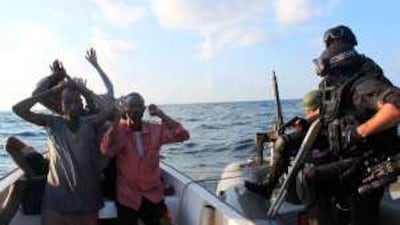Just when you think that unmanned drones, "asymmetric warfare" and the "hi-tech battlefield" have taken over theories of modern warfare, China always seems to pull you back to the 19th century, with its emphasis on mammoth standing armies and sprawling naval armadas. But Beijing's preference for these traditional means to project power appeared anything but a throwback last week, when a Chinese admiral proposed the construction of a naval base in the Gulf of Aden.
Although Rear Admiral Yin Zhou, a senior official at the navy's Equipment Research Centre, did not specify where a hub might be built, any base would deepen the Asian superpower's presence in the Arabian Sea and the western Indian Ocean, already the farthest westward advance of Chinese naval power since the waning days of the Silk Road 600 years ago. Then, as now, Beijing's goal for establishing a more permanent military presence far from its borders is to ensure the safety of trade routes. More recently, this has included the continued flow of crude oil and other raw materials.
There is no gainsaying China's increasing strategic and economic stakes in the region. Since the beginning of 2009, China has sent four naval flotillas to help escort about 1,300 Chinese and foreign ships through waters menaced by pirates operating off the coast of the East African country of Somalia, according to the Chinese news agency Xinhua. Each time, Chinese patrol ships have been forced to rely on access to a French naval base in Djibouti for resupply.
There is little question either about the growing peril to shipping in the Gulf of Aden and the Arabian Sea. China is the world's largest importer of crude oil and last year, the number of pirate attacks and hijackings of oil tankers hit a high, according to the International Maritime Bureau's Piracy Reporting Centre in Malaysia. Pirates last year attacked 42 oil-laden tankers around the world, a 40 per cent rise from 2008, the centre said, and most of the attacks occurred off the coast of Somalia and the Arabian Peninsula.
Finally, there is little doubt about the direct dangers to Chinese shipping, where trade not only in oil but in goods and raw materials with African countries has soared in recent years. Only last week, a Chinese cargo ship, the De Xin Hai, and its crew of 25 were rescued from Somali pirates after being held since October. Their release followed the payment of a ransom of US$4 million (Dh15m) to their kidnappers.
Given China's involvement in the region, a proposal to establish a military base was probably inevitable. "I believe that a relatively stable, relatively solid base for resupply and repair would be appropriate," Adml Yin said sensibly, adding that such a base would provide a steady source of fresh food, along with facilities for communications, ship repair and recreation. How much Adml Yin's comments, part of an interview posted on the Chinese defence ministry's website, reflected the views of other more senior Chinese officials was not clear.
But he notably distanced himself from any decision to establish a base, saying it was "entirely a matter for the country's foreign policy circles" and the Communist Party. If his proposal was intended as a trial balloon to test other Chinese government or foreign reaction, it was not immediately clear how well it went down. Governments have largely been shut down the past week. Still, attention immediately turned to India, Beijing's long-time rival and Asia's other economic colossus.
China's neighbours in the South China Sea - in particular Taiwan, the Philippines, Vietnam and Malaysia - are accustomed to Beijing's aggressive use of its naval forces to assert its claims in ongoing territorial disputes and to underline the prerogatives it regards as its due as a rising world power. But New Delhi has been especially alarmed as Beijing builds a chain of naval installations - dubbed a "string of pearls" strategy - across the Indian Ocean.
China has established a maritime reconnaissance and intelligence centre on the Coco Islands, leased from Myanmar. It is also building a major deepwater port on the Arabian Sea at Gwadar in Pakistan that could become a key naval base for China's expanding submarine fleet. Furthermore, despite an avowed policy of not maintaining foreign military bases, China is also reported to be interested in establishing naval bases in Bangladesh, Sri Lanka, Cambodia, Myanmar, Pakistan and Thailand to protect its maritime supply routes from the Middle East and Africa.
It remains to be seen whether Beijing can persuade New Delhi and other sceptical governments that its motives are benign. In his comments last week, however, Adml Yin appeared sensitive to suggestions that the establishment of a base in the Gulf of Aden was the tip of an iceberg, part of a Chinese government plan for an extensive network of foreign naval bases. "We are not saying we need our navy everywhere in order to fulfil our international commitments," he said. He added he hoped the nations in the region "would understand" China's need for a "permanent, stable" base for anti-piracy operations.
Then, to underscore how much he is aware that Chinese naval ships in the waters of the Indian Ocean and Arabian Sea have aroused suspicions, Admiral Yin noted that the first Chinese frigates deployed to the Gulf spent more than four months at sea without docking. "We didn't want to arouse unnecessary suspicion from some western countries," he explained. cnelson@thenational.ae

